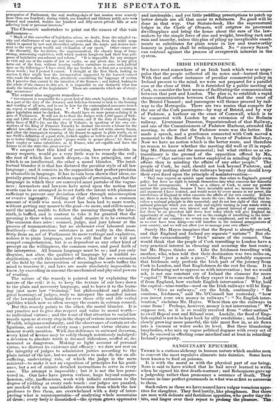IRISH INDEPENDENCE.
WE have read somewhere of an Irish bank which was so unpo-, polar that the people collected all its notes and—burned them! With that and other instances of peculiar commercial policy. in Ireland present to the mind, we were not prepared for a parallel case at the close of 1844. It is furnished by a public meeting at Cork, to consider the best means of facilitatingthe communication between that port and London. The plan is, to establish a rapid steam-communication between Cork Harbour and the coast of the Bristol Channel ; and passengers will thence proceed by railway to the Metropolis. There are two routes that compete for the use of the Cork passengers—by way of Bristol, and by way of Padstow, a harbour on the coast of Cornwall, which is to be connected with London by an extension of the Bodmin" railway. Lieutenant Dunstan, Superintendent of that Railway, and one of the Commissioners of Padstow Harbour, attended the meeting, to show that the Padstow route was the better. He made a speech, and a gentleman connected with Cork moved & memorial to the Board of Trade in favour of Padstow Railway. Now we have no notion which is the better route, and therefore no reason to know whether the meeting did well or ill in repel-, ling Mr. Dunstan and the memorial; but what strikes us as extraordinary is the ground of the opposition offered by Mr,. Hayes— that nations are better employed in minding their own affairs than in minding the affairs of an other people." Thepeople of Cork, he said, should not look beyond Padstow, and should say nothing about the railways beyond: they should keep their eyes fixed upon the principle of nonintervention " They may express an opinion upon matters that relate to England's general. policy, but have no right to intrude themselves into what concerns her domeetie and social arrangements. I wish, as a citizen of Cork, to enter my protest against this proceeding, because I have invariably acted so; because in theory and argument I have resisted, and would resist by every means in my power, the interference of England in what concerns the affairs of my own country. Believe me, there is more in this matter than meets the eye; there is something that involves a national principle in this memorial; and do not lose sight of that strong. national principle which you are daily and nightly turning in your minds with a view to improving your own interest and the general interest of your country. Let there be no precedent laid down here today which will give England an opportunity of saying, 'You have set us the example of interfering in the internal affairs of our country; we return you the compliment, and we willdo now as we ever have been doing—we will interfere in the internal arrangements of your country, and we will not allow you to manage your own affairs.'" Surely Mr. Hayes imagines that the Repeal is already carried, and that England and Ireland are separate" nations"! But observe the extraordinarily "Irish" nature of the counsel. One, would think that the people of Cork travelling to London have a, very practical interest in choosing and securing the best route ; .but Mr. Hayes thinks not. Like the Irishman travelling with another, who, when told that their destination was two miles on, exclaimed "just a mile a piece," Mr. Hayes probably supposes that Irishmen only perform the Irish part of the journey from Cork to London, and that Englishmen do the rest for them. It is very forbearing not to oppress us with intervention ; but we would ask, is not one constant cry of Ireland the clamour for more "capital"? Where on earth do they expect it to come from ? And if from England, how exclude English intervention ? Why, half the capital—nine-tenths—used on the Irish railways will be English. ' Give us railways," cry the Irish, continually : "se cautious, Irishmen," said Mr. O'Connell but yesterday, "how you invest your own money in railways " : "No English intervention," exclaims Mr. Hayes. Where then are the railways to come from ? Perhaps, however, money is not intervention ? We suppose not, as it is so ready received from "other nations" to swell Repeal rent and Riband rent. Luckily, the flood of English capital is not to be kept back by silly resolutions ; and, Ireland slowly growing more peaceful, the tide must flow in, as air flows into a vacuum or water seeks its level. But these blundering busybodies, who mix up vague political dogmas with every act of: life, do succeed in effecting some mischief and at least in retarding Ireland's prosperity.






















































 Previous page
Previous page